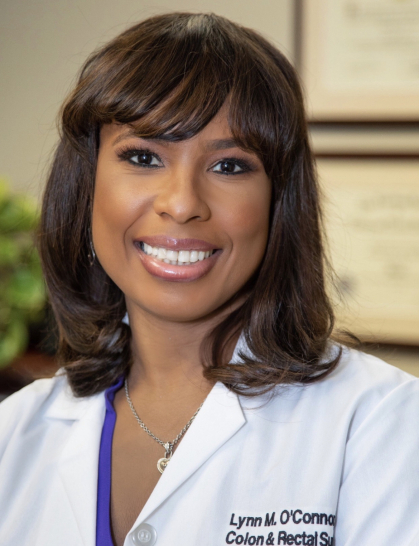Alumna Makes History as the NYPD’s First Black Female Colorectal Surgeon
ODASIS graduate plans to use her platform to promote early colorectal screenings and the importance of diversity in medicine
For the first time in its 178-year history, the New York Police Department welcomed its first Black female colorectal surgeon to the medical division: Rutgers alumna Lynn M. O’Connor.
The renowned surgeon made NYPD history on Sept. 25, 2023, when she was sworn in at One Police Plaza. O’Connor’s new duties with the NYPD include determining the fitness of officers for duty, coordinating care and authorizing medical service for line of duty injuries.

“It really is an honor and a privilege to be able to affect change in the lives of a lot of young officers,” said O’Connor, who is also chief of colon and rectal surgery at Mercy Hospital, Rockville Centre, N.Y., and St. Joseph Hospital in Beth Page, N.Y., and runs her own private practice on Long Island. “It means a lot because I always say to my students and my residents, ‘You can’t be what you can’t see.’”
O'Connor takes on her new role at a time when incidents of colorectal cancer have risen significantly in young people and become the second leading cause of cancer death in the United States. O’Connor plans to use her new platform to promote early colorectal screenings for the police department and healthy living.
“It’s really overall an amazing opportunity to treat these young men and women because we are finding that colorectal cancer is increasing steadily since the 1980s,” she said.
O’Connor, who comes from a “strong family of achievers,” said she knew as a child growing up in Queens, N.Y., she wanted to pursue a career in medicine. Her journey began at Rutgers University-New Brunswick, where she majored in biology and took advantage of every opportunity offered to her through the Office for Diversity and Academic Success in the Sciences (ODASIS). Launched in 1986, ODASIS identifies the individual needs of underrepresented and disadvantaged students in the sciences and aims to provide them with supplemental academic instruction, continued guidance, and advising.
“It was a pivotal part of the foundation for my academic success,” she said of ODASIS. “These students get the opportunity to be in the labs, shadow physicians, and get the skills they need to make themselves more attractive candidates for medical school.”
Under the mentorship of her “hero” the late Emmet A. Dennis Sr., professor and chair of the Department of Cell Biology and Neuroscience and pillar of ODASIS, O’Connor said she flourished. She soaked up experiences that prepared her for Yale University, where she earned a master’s in public health, and Temple University School of Medicine, where she graduated with a medical degree.
O’Connor returned to ODASIS in 2018 as the program’s keynote graduation speaker, where she was reunited with director Kamal Khan.
“To see ODASIS come so far, I thought it was absolutely wonderful. It’s evolved and continues to serve minority students,” she said. “Dr. Khan has done a phenomenal job leading it all these years.”
Khan remembers O’Connor as a student who “never said no” and was committed to her dream of working in medicine. He said he had “goosebumps” when he learned the news of O’Connor’s appointment within the NYPD.
“Once I saw the article, I started sending it to the alumni first, then the undergraduates. The response was, ‘Wow!’” he said. “When you read things like this and see where a student came from and where they have gone, it energizes and motivates them knowing they can do the same.”
Her role also shines a spotlight on the importance of representation in medicine, said O'Connor, who notes 13.6 percent of the population is Black but only 5.7 percent of all physicians are Black.
“Studies that show when African Americans are given the opportunity to be treated by Black physicians, outcomes are better,” she said. “There is more trust, better communication and greater adherence to the treatment plan.”


